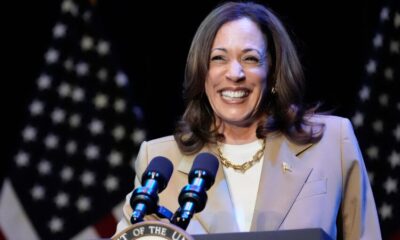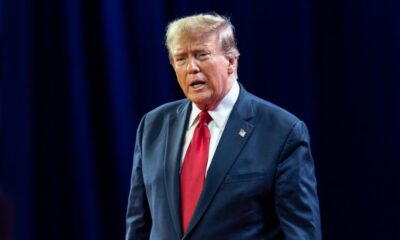Finance
Biden’s departure puts Trump’s trade in doubt as the election is reset
(Bloomberg) — Investors have been building up bets on Donald Trump’s return to the White House for weeks, including reducing their holdings of long-term U.S. bonds and buying Bitcoin. Now they are considering whether Joe Biden’s exit from the race will improve Democrats’ chances of victory — and how much they should recalibrate their bets.
Most read from Bloomberg
One thing appears certain after the president dropped his re-election bid: While the announcement was widely expected as the 81-year-old faced pressure from allies, it injects a wild card into the campaign that will likely translate into volatility in the markets.
“This means more uncertainty,” said Gene Munster, co-founder and managing partner at Deepwater Asset Management. “There was a lot of confidence in Trump’s victory, and the markets are not going to like this new uncertainty, along with the news cycle of who’s in, who’s out, and all those unknowns.”
Biden’s announcement Sunday that he was ending his efforts to seek another term and endorsing Vice President Kamala Harris is the latest in a number of political shocks that markets have absorbed in recent weeks.
As investors digest the latest news, the Trump trade — which favors sectors and strategies that benefit from the Republican’s advocacy for looser fiscal policy, higher trade tariffs and weaker regulation — is likely to face headwinds.
This comes as investors also brace for possible market convulsions following the wave of second-quarter earnings data that is only just beginning to emerge, and as they continue to plot scenarios for when the Federal Reserve will start cutting rates.
Investors are responding
The dollar fell in trading in Asia on Monday, with the euro, Swiss franc and Mexican peso making marginal gains. Treasury yields fell across the curve, while US stock futures were modestly higher.
“The most important thought process in the bond market should be what this new uncertainty brings. People had gotten to the point where they were getting into the Trump business — and it was starting to become a real story. I thought that was way too early,” said Glen Capelo, managing director of Mischler Financial. “The curve-steepening trade will probably have to settle down a bit.”
Markets may be nervous as traders wait to see if Harris secures her party’s nomination and gathers enough momentum to challenge Trump’s lead in the polls. As traders await new polls that reflect Biden’s absence, the betting market PredictIt has Harris as the favorite to become the Democratic nominee, but Trump still favored winning the presidency.
The basics of the Trump trade have taken the form of support for rising US bond yields, gains in banking, healthcare and energy stocks, as well as Bitcoin and a stronger dollar – even as Trump himself has indicated he prefers the US currency weakens.
Some of the Trump trading in the bond market already began to unwind last week, as investors turned their attention back to economic data and the Fed. Meanwhile, recent moves in stocks have been marked by a shift from Big Tech stocks to smaller companies in sectors that have fallen behind.
“Investors should expect a spike in volatility,” Dave Mazza, CEO of Roundhill Financial, said before Sunday’s announcement. “If Vice President Harris can quickly mobilize to give Trump a material run, we can expect volatility to continue. However, if Trump continues to make gains in the polls and investors view his victory as inevitable, the Trump trade will take over and volatility will decline.”
What Bloomberg Strategists Say…
“Unless there is a material change in Trump’s fortunes, traders are likely to position for dollar weakness as there could be more verbal attacks on weak foreign currencies heading into November. Meanwhile, government bonds will have a more nuanced picture. The steepening of the curve is likely to continue amid concerns about larger deficits, but within a framework of falling rates as the Federal Reserve moves toward its first rate cut this year.”
— Mark Cranfield, Markets Live Strategist. See more about MLIV.
There is little historical data available to understand how markets will react. The most recent example of a sitting president not seeking a second term was Lyndon Johnson in 1968.
“We just don’t have a high priority for a situation with a candidate who hasn’t gone through the normal primary process,” said Julie Biel, portfolio manager and chief market strategist at Kayne Anderson Rudnick. “So we continue our very long love affair once again in unprecedented times.”
Some investors in Asia, before Biden dropped out of the race, saw Trump trading as actually benefiting from his departure, which could lead to pressure on everything from broad Chinese stock benchmarks to the shares of Korean battery makers in the region.
Asian shares fell on Monday, while Taiwanese and Korean shares underperformed, although analysts said the moves were largely due to negative sentiment towards the technology sector.
Complicating bets on Asian currencies is Trump’s criticism of the current weakness of the yen and yuan, which could limit pressure even as his victory is expected to broadly strengthen the dollar. The yen was modestly stronger in afternoon trading in Tokyo.
“President Biden’s withdrawal at the election creates new uncertainties in the market,” said Johanna Chua of Citigroup Inc. “The market will reassess not only the distribution of presidential race odds, but also the implications for the outcomes of the congressional race.”
–With assistance from Carter Johnson, Anya Andrianova, Bre Bradham, Tasos Vossos, Elizabeth Stanton, Ruth Carson, Nazmul Ahasan, George Lei, Isabelle Lee, Elena Popina, Michael Mackenzie, Ryan Vlastelica, and Matthew Burgess.
(Updates market movements and adds commentary)
Most read from Bloomberg Businessweek
©2024 BloombergLP











